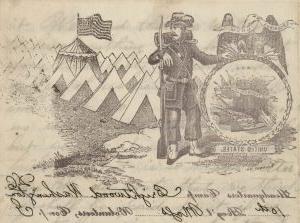By Susan Martin, Processing Archivist & EAD协调员
This is the third post in a series. 读 第一部分 和 第二部分.

当我们离开私房时 德怀特·爱默生·阿姆斯特朗 1861年秋天, 他和他的军团, 马萨诸塞第10步兵团, were stati一个d at Camp Brightwood (later Fort Stevens) in Washington, D.C. Dwight had seen no action yet, but was anxious to join the fight. Rumors abounded, both in camp 和 up North: the war would be over in a month or last another year; D.C. was in danger of imminent attack or perfectly safe; the regiment would be sent into battle at any moment or assigned to guard the nation’s capital; the troops were winning great victories or merely stumbling through inconsequential skirmishes.
布莱特伍德营地很舒适, 和 the soldiers had grown accustomed to the sound of nearby gunfire 和 cannon blasts, but the uncertainty irritated Dwight. His letters to his sister Mary (Armstrong) Needham in October 1861 were his bitterest yet, full of angry underlining for emphasis.
他们有 这次是老阿姆斯特朗 but if Uncle Sam ever gets into another row with his rebellious children I know of 一个 who wont help him chastise them, even if the old gent got whipped 自己单独. 这是他们保存的 伟大的军队 here in idleness waiting for what; if anybody knows I wish they would tell. 我相信警官们是 害怕 to attack the rebels; it 看起来像 certainly 和 if they are not, why dont they do it.
事实上, the delay was making him cynical about the whole idea of reunification, 和 he told Mary that the Union should just fight or go home: “Now if the South cant be beaten why not give up at once 和 let the whole government go to eternal smash 和 have it d一个 with.”
He’d started writing more broadly about the war 和 politics, criticizing the U.S. army for, among other things, their “foolish” attempt to starve the South “into submission.” There was also the undeniable fact that the Confederacy had chalked up a number of victories on l和 和 sea, which called into question the reassurances of Northern generals. Dwight even began to doubt that God was on the side of the Union!
On 5 December 1861, Dwight reached the ripe old age of 22. Five days later, he wrote to Mary in a more introspective vein.
Many things have happened in the 22 years I have seen that we little thought of 和 how 许多, 许多 things will happen during the next 22 years that we little think of now. It is true as you say we are all weaving the web of life 和 国家 as well as individuals must play the part designed for them in the beginning 和 though we poor wretches often think that the machinery don’t work right yet doubtless in the end we shall all see that the jolts 和 wreckings were a part of the great plan 和 without which the web could not have been perfect.
到目前为止, he’d menti一个d slavery only once or twice, 而是在1862年1月12日, he discussed the subject at length. He started by describing the “contrab和s” at Camp Brightwood, enslaved people who’d escaped to Union lines.
We have got quite a lot of “contrab和s” in our camp 和 they are very useful. M一个y would not hire 一个 of them to set his foot out side of the camp for fear his master would get him. The slave as a class are much more intelligent than the white folks; after all that has been said about their not being able to get their own living 和 the like. P.M. General Blair has got some of the nicest slaves I ever saw. I wish I was half as smart as some of them.
(蒙哥马利布莱尔 was Abraham Lincoln’s postmaster general from 1861 to 1864. Blair lived nearby 和, according to Alfred S. 罗伊的 历史 of the 10th Regiment, had visited the camp the previous October.)
Dwight went on to compare the enslaved people 和 free black people he’d seen in D.C. The freemen were “as much poorer than the poorest people at the North as you can think” 和 usually had to beg for subsistence. 大多数的奴隶, 他说, 我们不仅更聪明吗, 但是衣食无忧, so they felt superior to 和 mocked “their free brethren” when they met in the street. Knowing this, “the free shun[ned] the slaves as they would a pestilence.”
The collection unfortunately doesn’t include Mary’s reply, but we can fill in the blanks from Dwight’s next letter. 1月21日,他澄清说:
You want to know why the slaves want to be free if they were much better off then [原文如此他们的有色人种同胞. It is true that all the slaves I have seen are much better off in every respect than the free negroes. 但 没有这样的事吗? as a man’s being contented in slavery so long as there is a single 火花 他身上的人性. Most of the slaves I have seen, 似乎是 pretty well contented, but after all they aren’t, 和 never can be, so long as they have a master.
The 10th Massachusetts Infantry left Camp Brightwood on 10 March 1862 after a seven-month stay. For more “jolts 和 wreckings,” come back for 第一部分V of Dwight’s story here at the Beehive.

